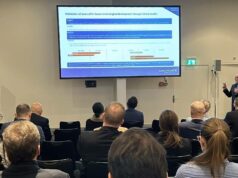
Chordate Medical resumes initiative with Nanos Medical in China
Chordate Medical is making progress in China with K.O.S. rhinitis treatment. The company has received a prepaid order for two new-generation K.O.S. devices from Changyong Medical Technology, the joint venture company co-owned with Nanos Medical in Shanghai. The market registration process in China has resumed and a new joint venture agreement is being negotiated with Nanos Medical. BioStock had the opportunity to talk to Nanos Medical’s CEO Terry Cui about the collaboration with Chordate Medical and the potential in China for K.O.S.
 Medtech company Chordate Medical has developed Kinetic Oscillation Stimulation (K.O.S.), a treatment for chronic nasal congestion (rhinitis) and chronic migraine. K.O.S. is currently marketed via distributors in the Nordics, Italy and Saudi Arabia.
Medtech company Chordate Medical has developed Kinetic Oscillation Stimulation (K.O.S.), a treatment for chronic nasal congestion (rhinitis) and chronic migraine. K.O.S. is currently marketed via distributors in the Nordics, Italy and Saudi Arabia.
In 2018, Chordate Medical and the Shanghai-based company Nanos Medical set up a joint venture and formed Changyong Medical Technology with the intention to market K.O.S. in China. Now, Chordate Medical has received a first order of two K.O.S. devices at a value of SEK 167 000. Also, a new agreement regulating the cooperation for the jointly owned company is being negotiated. Anders Weilandt, CEO at Chordate Medical, commented on the progress in China in a press release:
»I see this order as a confirmation of that both our partner and the Chinese market are handling the pandemic well, and also that we have a partner with capital strength who invests in the K.O.S. treatment.«
Two K.O.S. machines ordered
The prepaid order from Nanos Medical pertains to two K.O.S. machines that will be delivered to Changyong Medical Technology. These units will be used to carry out the product registration process required by the authorities in China to market K.O.S. as treatment for rhinitis. Nanos Medical assessment is that the process to obtain market approval can be completed within 15 months.
Market registration process resumed
According to Chordate Medical, the market registration process in China has been delayed compared to the original plan. This is because all non-priority clinical trials have been stopped in China during the pandemic, but also that all new product registrations were stopped before the new medtech legislation came into force in China at the turn of 2021.
Anders Weilandt explains that the root causes have been outside Chordate Medical’s and Nanos Medical’s control:
»The project to secure access to the Chinese market is severely delayed compared to the original plan. However, I note that the root causes for that lies largely beyond the control of the parties. Therefore, it is extra gratifying that the process now accelerates again.«
Interview with Nanos Medical’s CEO
Nanos Medical owns 2/3 of Changyong Medical Technology and Chordate Medical owns 1/3 of the co-owned company. Nanos Medical will finance all the marketing and sales in China while Chordate Medical contribute with their Chinese patents for K.O.S. A new joint venture agreement between the two parties is being finalised and is expected to be presented soon.
Nanos Medical is a medical company headquartered in Shanghai. It is primarily dedicated to providing diagnostic and treatment services for the ENT field (ear, nose, and throat). BioStock reached out to Terry Cui, Nanos Medical’s CEO, to get his thoughts on the cooperation with Chordate Medical.
First of all, can you give us some background information about Nanos Medical and the company’s position on the Chinese market?
– Nanos Medical is a young Chinese medtech company focusing on the ENT therapeutics area. We aim to provide an integrated diagnostical and surgical solution to ENT doctors. Our product offering covers ENT workstations, image systems, endoscopes, powered surgical tools, energy ablation systems, surgical planning systems and a wide range of implantable devices. The portfolio consists of in-house developed products, acquired products, as well as in-licensed products.
– Currently, we are ranked number two out of the six leading players on the China ENT market. The five other players are Medtronic, Skyker, Karl-Storz, Smith&Nephew and Olympus. Nanos Medical is the only domestic company among the top six, and we have achieved the highest growth rate – CAGR over 150 per cent – during the past 5 years. We will almost surely further consolidate our market position and hope to become the number one player by next year.
Changyong Medical Technology is your jointly owned company with Chordate Medical for marketing and sales of K.O.S. on the Chinese market. What are your hopes and plans going forward for Changyong Medical Technology?
– Rhinitis is a very common disease in China affecting more than 100 million people, and there are only few therapeutic methods to treat it. So there is a solid addressable market for Chordate Medical’s K.O.S. system. We believe the product could be widely accepted and generate significant revenue streams during the next 5 to 10 years if a well-planned market entry program is introduced, combined with current sales and pricing strategy. Changyong is the culmination of the joint efforts to combine Chordate’s technology and Nanos’ marketing strength, and we are sure we will succeed in China.
»Rhinitis is a very common disease in China affecting more than 100 million people, and there are only few therapeutic methods to treat it.«
What is the potential for Chordate Medical’s K.O.S. rhinitis treatment in China according to your assessment?
– As mentioned, there are over 100 million people suffering from rhinitis and we believe it could be a big market, we expect to install the system to over 2 000 hospitals during the next 5 to 8 years, and hopefully it can benefit millions of patients every year in the future. But, as a first step, we must register the product in China and improve it continuously.
The collaboration with Chordate Medical, as well as the market registration process for K.O.S. in China, have been on hold for some time. Could you tell us more about the reasons behind this and why now is a good time to re-start the collaboration?
– There are several unexpected reasons for the delay. Initially, we were waiting for the second generation system to be available for registration because we all believe the new system is more competitive on the Chinese market. Unfortunately, when the second generation was ready, we encountered the Covid pandemic, and any new non-Covid related clinical trials were put on hold until earlier this year.
– Almost everything has changed after the Covid situation for the Chinese healthcare industry. The government imposed stricter regulations for all new clinical trials involving a foreign company or foreign products. On the other hand, the intensifying government-backed efforts for a volume-based purchasing program for medical devices also implied new economic challenges for new technologies and products. All these circumstances lead to the long delay of our initial business plan.
– However, these challenges do not change the most important fact that K.O.S. system is a good product and that it meets the very real medical need in the market. That is why we choosed to resume the project once the obstacles were cleared. The market approval process will take about 15 months if no clinical trial is required. Another 12 months will be required if a clinical trial is needed, although we believe that’s not very likely.
»These challenges do not change the most important fact that K.O.S. system is a good product and that it meets the very real medical need in the market«
Finally, what are your general thoughts on Chordate Medical and the company’s treatment method K.O.S.?
– The MedTech industry is always driven by innovation; this is the core value of the whole game. And we deem Chordate to be a real innovator in this very promising niche market and believe it will become a star in the business.
The content of BioStock’s news and analyses is independent but the work of BioStock is to a certain degree financed by life science companies. The above article concerns a company from which BioStock has received financing.



